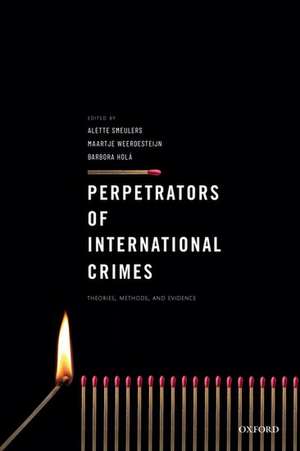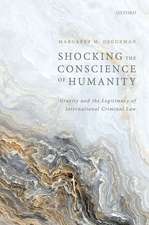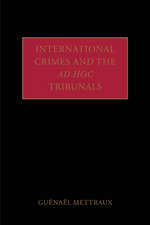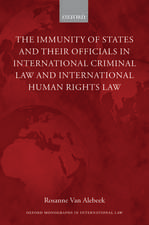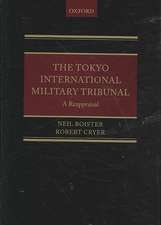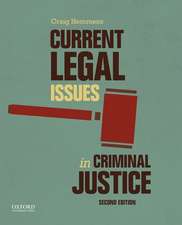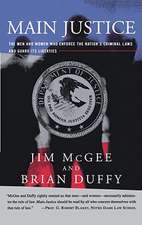Perpetrators of International Crimes: Theories, Methods, and Evidence
Editat de Alette Smeulers, Maartje Weerdesteijn, Barbora Holáen Limba Engleză Hardback – 18 feb 2019
Preț: 690.66 lei
Preț vechi: 946.03 lei
-27% Nou
Puncte Express: 1036
Preț estimativ în valută:
132.18€ • 137.48$ • 109.12£
132.18€ • 137.48$ • 109.12£
Carte tipărită la comandă
Livrare economică 03-09 aprilie
Preluare comenzi: 021 569.72.76
Specificații
ISBN-13: 9780198829997
ISBN-10: 019882999X
Pagini: 404
Dimensiuni: 164 x 242 x 30 mm
Greutate: 0.77 kg
Editura: OUP OXFORD
Colecția OUP Oxford
Locul publicării:Oxford, United Kingdom
ISBN-10: 019882999X
Pagini: 404
Dimensiuni: 164 x 242 x 30 mm
Greutate: 0.77 kg
Editura: OUP OXFORD
Colecția OUP Oxford
Locul publicării:Oxford, United Kingdom
Recenzii
Perpetrators of International Crimes clearly goes beyond what has been studied so far, approaching the theme of perpetrators from innovative angles, while introducing new and helpful categories for further exploration. The sheer complexity of the topic understandably renders contributors unable to fully explain all the factors driving individuals to committing mass atrocities. Yet, the value of the new volume is, arguably, not in capturing all of the strands of this multifaceted phenomenon but in its effort to develop explanatory categories, paradigms and points of view that will be used by the future generations of criminology scholars and policy makers.
Notă biografică
Alette Smeulers is Professor of Criminal Law and Criminology of International Crimes at the University of Groningen. She is a political scientist by training but specialized in the psychology of perpetrators and did her PhD in international criminal law. Her research focuses on the international crimes, the causes of these types of crimes, and the perpetrators of these crimes as well as the international criminal justice system. In her research she takes an inter- and multidisciplinary approach. She has published extensively on these subjects and has presented numerous papers at international conferences and at a wide range of universities in Europe and the United States.Maartje Weerdesteijn is Assistant Professor at VU University Amsterdam and a Researcher at the Center for International Criminal Justice. She obtained a PhD from Tilburg University, Department of Criminal Law, a Master in International Crimes and Criminology from VU University Amsterdam (Cum Laude), and a Bachelor in European Studies from Maastricht University (Cum Laude). In 2014 she was a visiting scholar at Griffith University Australia at the Griffith Asia Institute. Her book The Rationality of Dictators: Towards a more effective implementation of the responsibility to protect was published by Intersentia.Barbora Holá is Associate Professor at VU University Amsterdam and Senior Researcher at the Netherlands Institute for the Study of Crime and Law Enforcement (NSCR). She is co-director of the Center for International Criminal Justice and co-chair of the European Society of Criminology Group on Atrocity Crimes and Transitional Justice. She has an interdisciplinary focus and studies transitional justice after atrocities, in particular (international) criminal trials, sentencing of international crimes, enforcement of internaional sentences, rehabilitation of war criminals, and life after trial at international criminal tribunals. She has published extensively on these subjects and presented at international conferences and universities in Europe, Africa, Australia, and the America's.
